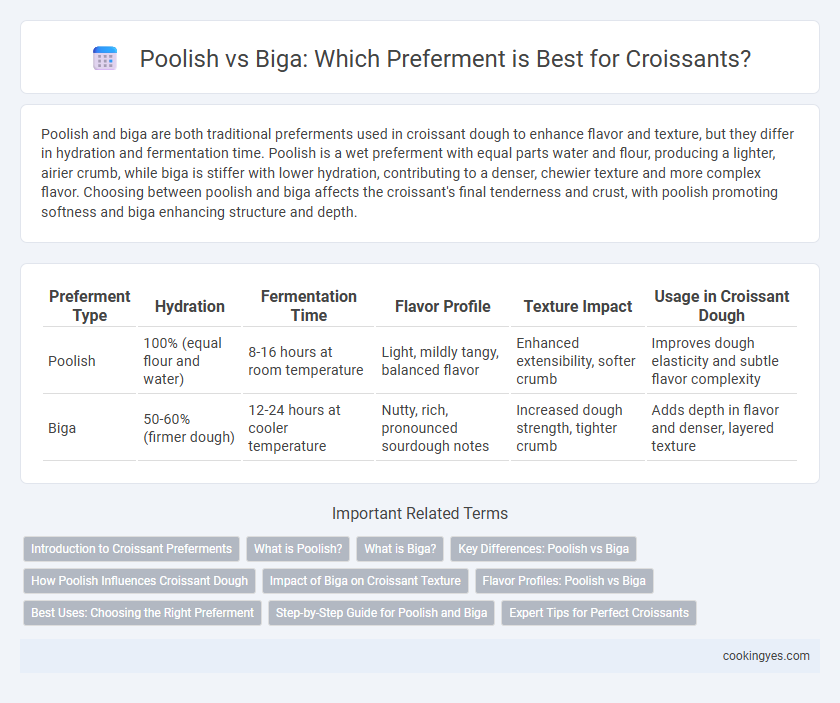Poolish and biga are both traditional preferments used in croissant dough to enhance flavor and texture, but they differ in hydration and fermentation time. Poolish is a wet preferment with equal parts water and flour, producing a lighter, airier crumb, while biga is stiffer with lower hydration, contributing to a denser, chewier texture and more complex flavor. Choosing between poolish and biga affects the croissant's final tenderness and crust, with poolish promoting softness and biga enhancing structure and depth.
Table of Comparison
| Preferment Type | Hydration | Fermentation Time | Flavor Profile | Texture Impact | Usage in Croissant Dough |
|---|---|---|---|---|---|
| Poolish | 100% (equal flour and water) | 8-16 hours at room temperature | Light, mildly tangy, balanced flavor | Enhanced extensibility, softer crumb | Improves dough elasticity and subtle flavor complexity |
| Biga | 50-60% (firmer dough) | 12-24 hours at cooler temperature | Nutty, rich, pronounced sourdough notes | Increased dough strength, tighter crumb | Adds depth in flavor and denser, layered texture |
Introduction to Croissant Preferments
Poolish and biga are two popular preferments used in croissant dough to enhance flavor and texture. Poolish, a wet preferment with equal parts flour and water plus a small amount of yeast, creates a more open crumb and tangy taste ideal for delicate, flaky croissants. Biga, a stiffer preferment with less hydration, develops a nutty flavor and denser structure, contributing to the signature layered texture and rich aroma of traditional croissant pastries.
What is Poolish?
Poolish is a type of preferment used in bread and pastry making, characterized by a wet, sponge-like consistency with equal parts flour and water and a small quantity of yeast. It enhances dough flavor, improves texture, and extends shelf life by allowing fermentation to develop complex aromas and gluten structure. Preferred in French baking, poolish contributes to the delicate crumb and slight tang typical of artisanal croissants.
What is Biga?
Biga is a traditional Italian preferment used in bread and croissant making, characterized by a stiff, dough-like consistency with low hydration levels around 50-60%. It ferments slowly over 12 to 16 hours, developing a nutty flavor and enhancing the dough's structure and crumb. Compared to Poolish, which is more liquid and rapid-fermented, Biga provides better strength and elasticity, essential for flaky, layered croissants.
Key Differences: Poolish vs Biga
Poolish is a wet preferment with equal parts flour and water, producing a batter-like consistency that enhances dough extensibility and flavor complexity. Biga is a stiff preferment with lower hydration, resulting in a drier, crumbly texture that improves dough strength and fermentation control. The key differences between Poolish and Biga lie in hydration levels, texture, and their impact on dough elasticity and final bread crumb structure.
How Poolish Influences Croissant Dough
Poolish, a wet preferment with equal parts flour and water and a small amount of yeast, enhances croissant dough by improving its hydration and extensibility, resulting in a lighter, flakier texture. The higher hydration level in poolish promotes better gluten development and fermentation, which contributes to complex flavors and an open crumb structure. Compared to biga, poolish accelerates fermentation and imparts a softer dough, making it ideal for the delicate layers characteristic of croissants.
Impact of Biga on Croissant Texture
Biga preferment enhances croissant texture by creating a denser, chewier crumb structure with more complex flavor development due to its longer fermentation and lower hydration. This slow fermentation process promotes stronger gluten formation, resulting in flakier, more resilient layers compared to the softer, airier crumb produced by Poolish. Bakers seeking a croissant with distinct, well-defined layers and a subtle, nutty tang often prefer biga to optimize both texture and taste.
Flavor Profiles: Poolish vs Biga
Poolish, a hydrophilic preferment with equal parts flour and water, creates a more open crumb and subtle, mildly tangy flavor due to its shorter fermentation time and higher hydration. Biga, an Italian preferment with lower hydration around 50-60%, develops a denser crumb and pronounced nutty, complex flavors from extended fermentation and lower water content. Bakers choose Poolish for lighter, aromatic bread and Biga for robust, deeply flavored crusts, emphasizing their distinct impact on texture and taste.
Best Uses: Choosing the Right Preferment
Poolish, a wet preferment with equal parts water and flour, is ideal for creating light, airy croissants with a tender crumb and slightly tangy flavor, enhancing the dough's extensibility and fermentation speed. Biga, a stiffer preferment with lower hydration, is best suited for croissants requiring a chewier texture and more complex, nutty flavors due to its slower fermentation and higher acidity. Choosing between poolish and biga depends on desired croissant texture and flavor: poolish favors softness and mild tang, while biga offers structure and depth.
Step-by-Step Guide for Poolish and Biga
Poolish, a loose, batter-like preferment made with equal parts water and flour and a small amount of yeast, requires mixing the ingredients, fermenting at room temperature for 12 to 16 hours until bubbly, and then incorporating into the dough. Biga, a stiffer preferment with lower hydration, involves combining flour, a small portion of yeast, and just enough water to form a firm dough, allowing it to ferment for 16 to 24 hours at a cooler temperature to develop complex flavors. Both methods improve croissant dough by enhancing flavor and texture, but Poolish promotes a more open crumb, while Biga yields a denser, chewier bite.
Expert Tips for Perfect Croissants
Poolish and biga are essential preferments in croissant dough, with poolish offering a wetter, more extensible dough that enhances flavor and crumb texture, while biga provides a firmer, drier consistency contributing to a chewier, more structured pastry. Expert bakers recommend poolish for croissants aiming for an open, airy crumb with subtle acidity, ideal for layering butter, whereas biga suits those seeking a tighter crumb and intensified nutty flavor. Precise hydration levels and fermentation times tailored to each preferment type ensure optimal gluten development and dough extensibility for perfect lamination and rise.
Poolish vs Biga for Preferment Infographic

 cookingyes.com
cookingyes.com